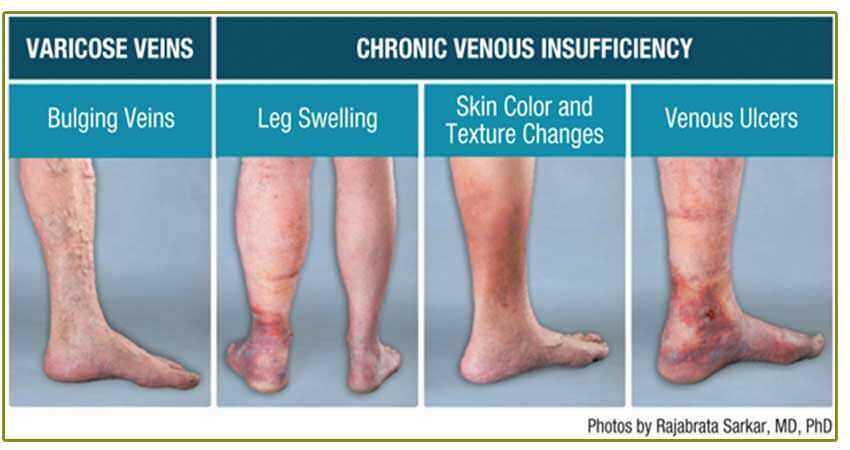
10 Myths About Venous Insufficiency
“Vein treatments are for cosmetic concerns only.” Often thought as a cosmetic nuisance, varicose veins represent an underlying venous disease that

When varicose veins ache and the discomfort keep you from living life to the fullest, you'll want quick relief. Try these at-home remedies to ease the pain until you're able to receive medical treatment that eliminates varicose veins.
Roughly 20 percent of American adults have varicose veins. For some, the bumpy blue or purple veins on the legs and feet cause no symptoms except for their bulging appearance. However, others may experience pain, swelling, itching, cramping, and heaviness from their varicose veins. If you’re in the latter group, you’re probably no stranger to seeking quick treatment to reduce the discomfort.
Varicose veins are one sign of venous insufficiency, a broad medical term referring to improper blood flow in the veins. Within the veins are tiny valves that help blood return to the heart. But the valves can weaken due to a number of factors, including heredity, pregnancy, age, gender, and lack of exercise. When that happens, blood backslides and pools in the vein, causing it to become a visible (and uncomfortable) varicose vein.
Painful varicose veins can make performing daily tasks difficult. Untreated varicose veins may also lead to complications, such as changes in skin texture and open sores. Although you may be considering professional treatment as a long-term solution, here are some at-home measures to help dial down the pain in the meantime:
Elevate Your Legs. The valves in the leg veins face constant pressure from gravity as blood pumps upward to the heart. You can counteract that pressure by elevating your legs for 15 minutes a day.
Wear Compression Stockings. Compression stockings aren’t a cure for varicose veins, but these snug elastic garments apply gentle pressure to the legs and help push blood through the veins. When blood flows smoothly, you’ll experience less swelling and discomfort.
Splash Cold Water on Your Veins. If your varicose veins are achy at the end of the day, splash cold water on them. Cool temperature shrinks veins, encouraging circulation and reducing pain and swelling. Conversely, hot water tends to dilate veins, increasing the discomfort.
Move Your Body. Blood pools in the veins when you sit or stand all day. But moving your body encourages blood flow. A brisk walk, bike ride, or simply flexing your ankles at your desk can wake up sluggish blood flow.
Although these at-home remedies provide quick relief, you’ll want a more permanent solution. Treatment for painful varicose veins requires minimally invasive surgical procedures performed by a vein specialist. Treatments include:
Sclerotherapy. The vein doctor injects a solution called a sclerosant into the problem vein. This irritates the vein causing it to scar and forcing blood to reroute through healthier veins.
Endovenous laser ablation and radiofrequency ablation. During this minimally invasive procedure, the doctor uses heat to close off blood flow to the problem vein. Blood reroutes to healthier veins.
All these surgeries are performed as an outpatient and can be completed within an hour. With some minor precautions, you can return to normal activities within a day.
The best way to avoid the pain of varicose veins is to maintain your vein health, so they function correctly. Your vascular network of veins, arteries, and capillaries stretches over 60,000 miles in your body. Taking care of your veins is just as important to your overall health as keeping your heart healthy and muscles strong. Try these tips for maintaining healthy, functioning veins:
Watch Your Weight. Every extra pound you carry adds more pressure on your veins, making it harder for them to circulate blood. Weight loss reduces pressure on the veins, so blood flows more freely.
Exercise. Exercise helps you shed pounds and supports blood flow through the leg veins by engaging calf muscles. Thirty minutes a day of mild cardiovascular exercise such as walking, biking, gentle weight training, yoga, or swimming invigorates circulation. It also strengthens veins and arteries to deliver oxygen and blood better to your organs and tissues.
Eat Healthily. The foods you consume can either hurt or help your veins. Pack your plate with colorful fruits and vegetables rich in antioxidants and bioflavonoids for healthy veins. Red peppers, oranges, strawberries, spinach, brussel sprouts, and broccoli are filled with the vein-strengthening vitamins K, C, and E. And don’t forget about water! Water thins your blood to help it circulate smoothly.
Stop Smoking. The chemicals in cigarettes narrow the blood vessels and thicken your blood, putting you at risk of blood clots.
Manage Your Blood Pressure. High blood pressure adds stress to those all-important vein valves, causing them to lose strength and elasticity. Your doctor can talk to you about lowering your blood pressure; however, reducing your sodium intake is an excellent place to start. If you don't know your blood pressure, you can have it taken at a local pharmacy, some gyms and health clubs, local community events, and at some workplaces.
Center for Vein Restoration operates three conveniently located clinics in the Atlanta area, led by experienced and knowledgeable vein specialists. Keith S. Moore, MD, is a board-certified general surgeon who specializes in vein procedures. Louis Prevosti, MD, FACS, is board-certified in thoracic and cardiovascular surgery. James Fonger, MD, FRCS, is board-certified in general and cardiovascular surgery. Contact their offices today for a consultation.
Gwinnett Professional Center
601 Professional Drive
Suite 170
Lawrenceville, GA 30046
Northside Center Pointe
1100 Johnson Ferry Road NE
Suite 165
Atlanta, GA 30342
Camp Creek Medical Center
3886 Princeton Lakes Way
Suite 140
Atlanta, GA 30331